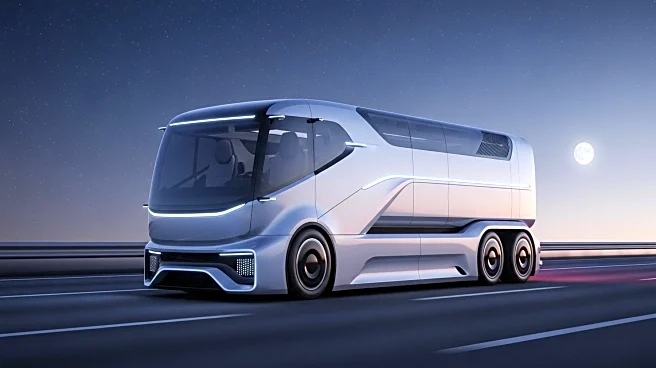What is the story about?
What's Happening?
Einride, a Swedish company specializing in autonomous electric trucks, has received a $100 million investment from EQT Ventures and other investors. This funding round has elevated Einride's valuation to over $1 billion, marking its status as a 'unicorn'. The investment is aimed at accelerating the deployment of Einride's autonomous freight technology, which includes the Gen 2 Rigid Large electric truck, recently renamed eBot. This vehicle is designed without a driver's cab, steering wheel, or pedals, emphasizing its autonomous capabilities. Einride is active in the U.S. and UAE, having launched an electric freight solution for DP World in Dubai. The company is also considering an initial public offering in the United States.
Why It's Important?
The investment in Einride underscores the growing interest and confidence in autonomous electric freight technology, which could significantly impact the logistics and transportation industries. By advancing autonomous electric trucks, Einride aims to reduce carbon emissions and enhance efficiency in freight transport. The U.S. market, where Einride is expanding, stands to benefit from these innovations, potentially leading to reduced transportation costs and environmental impact. Investors and stakeholders in the logistics sector may see this as a pivotal moment for the adoption of autonomous technology in freight operations.
What's Next?
Einride's plans for an initial public offering in the U.S. could further bolster its growth and market presence. As the company continues to develop its autonomous technology, stakeholders will be watching for regulatory developments and potential partnerships that could facilitate wider adoption. The success of Einride's autonomous trucks in real-world applications, such as the recent demonstration in Antwerp-Bruges, will be crucial in determining the future trajectory of autonomous freight solutions.
Beyond the Headlines
The ethical and legal implications of autonomous freight technology are significant. As these vehicles operate without human drivers, questions about liability, safety standards, and regulatory compliance will need to be addressed. Additionally, the shift towards autonomous vehicles may impact employment in the trucking industry, necessitating discussions on workforce transition and retraining.















